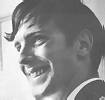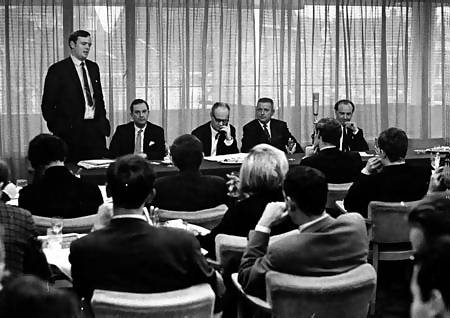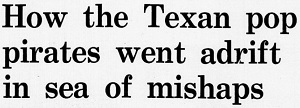Swinging Radio England was first heard with test transmissions in May 1966. Regular programmes began in June but things did not run smoothly. By the autumn, all the original American ‘boss jocks’
had returned home. Of the second wave of US talent, Chuck Blair had moved into a management position on land and, when he left the company soon afterwards, was replaced as Operations/General
Manager by Jack Curtiss. Bill Berry was still on the ship, as Programme Director/Senior DJ. Boom Boom Brannigan was working
alongside him as Assistant PD. The Australian members of the original team were long gone but two of the original Brits, Johnnie Walker and Roger Day, were
still taking care of business. They had been joined by other broadcasters such as American Mark Stevens and former Radio Caroline man, Canadian Errol Bruce.
By this stage neither Radio England nor sister station Britain Radio had many advertisers. The latter had the larger income, thanks to its contract to broadcast The World Tomorrow evangelical programme twice
daily. Radio England's revenue mainly came from mail-order ‘special offers’. There just wasn't enough money coming in to sustain the two stations. Something was going to have to give.

|

|

|

|

|
| Johnnie Walker
|
Errol ‘Bosscat’ Bruce
|
Gordon Bennett
|
Bill ‘Boss’ Berry
|
Phil Martin
|
The first the DJs knew of it was when a local East Anglian newspaper reported that one of the two stations would be closing down to be replaced by a Dutch service. At that time it was not known which
would be closing but it was enough to convince Radio England DJ Johnnie Walker that it was time to look for a new job. On his last show he dropped a number of very obvious hints that he was moving to Radio Caroline,
playing their “take a portable radio” jingle and even snippets of Caroline by The Fortunes, the station's theme tune.
 Johnnie Walker on his last show for Swinging Radio England, 15th October 1966. Recording courtesy of The Offshore Radio Archive (duration 2 minutes 18 seconds)
Johnnie Walker on his last show for Swinging Radio England, 15th October 1966. Recording courtesy of The Offshore Radio Archive (duration 2 minutes 18 seconds)
Johnnie was right in his assumption that it was Swinging Radio England that was about to close down. The disc-jockeys were informed by Brian Tylney. He had previously
been one of their on-air colleagues but was now working for the firm that tendered and maintained the ships. SRE was to be replaced by a Dutch service. Announcements about this new station referred to it as “Swinging
Radio Holland”.
 Dutch language promotion for Swinging Radio Holland. Recording kindly provided by Svenn Martinsen (duration 10 seconds)
Dutch language promotion for Swinging Radio Holland. Recording kindly provided by Svenn Martinsen (duration 10 seconds)
|

|
|
General manager Jack Curtiss announces the arrival of the Dutch service at a press conference in Holland.
|
Radio England closed down on Sunday 13th November 1966. On board at the time were Bill ‘Boss’ Berry, Mark Stevens, Errol ‘Bosscat’ Bruce, Roger Day (the only surviving member of the original
launch team) and the newest recruit, Bruce Wayne. Boom Boom Brannigan had left the previous day.
 Errol ‘Bosscat’ Bruce ends his last show on Swinging Radio England, 13th November 1966 (duration 2 minutes 25 seconds)
Errol ‘Bosscat’ Bruce ends his last show on Swinging Radio England, 13th November 1966 (duration 2 minutes 25 seconds)
 Phil Martin reads the news then Errol Bruce and Mark Stevens start the final Rock'n'Roll Revival Hour on Swinging Radio England, 13th November 1966, also featuring the voice of Chuck Blair. Both recordings
kindly provided by Svenn Martinsen (duration 2 minutes 46 seconds)
Phil Martin reads the news then Errol Bruce and Mark Stevens start the final Rock'n'Roll Revival Hour on Swinging Radio England, 13th November 1966, also featuring the voice of Chuck Blair. Both recordings
kindly provided by Svenn Martinsen (duration 2 minutes 46 seconds)

|

|

|

|

|
| Roger Day
|
Mark Stevens
|
Chuck Blair
|
Boom Boom Brannigan
|
Peter van den Hoven
|
That night at 11pm, the final show on Swinging Radio England began. Considering how many excellent programmes the station had broadcast over the previous six months, it is a shame that the final one
was something of a shambles. Hosted by Mark Stevens, all the SRE DJs on board took part, as did Gordon Bennett and Phil Martin from Britain Radio. Here are seven
cuts from that final half-hour.
 Britain Radio's Gordon Bennett, more used to reading the news than playing records on SRE, might not know the names of the songs but he is more than willing to demonstrate his ability with a funny accent (duration 2 minutes
4 seconds)
Britain Radio's Gordon Bennett, more used to reading the news than playing records on SRE, might not know the names of the songs but he is more than willing to demonstrate his ability with a funny accent (duration 2 minutes
4 seconds)
 Professional American DJs get used to seeing radio stations close down or change format so maybe the end of SRE did not mean much to Bill ‘Boss’ Berry. He doesn't sound too upset (duration 1 minute 13 seconds)
Professional American DJs get used to seeing radio stations close down or change format so maybe the end of SRE did not mean much to Bill ‘Boss’ Berry. He doesn't sound too upset (duration 1 minute 13 seconds)
 Bruce Wayne plugs the fact that he and Roger Day are going to be appearing on ITV's Ready Steady Go later in the week. Does anyone remember seeing them on the show? (duration 58 seconds)
Bruce Wayne plugs the fact that he and Roger Day are going to be appearing on ITV's Ready Steady Go later in the week. Does anyone remember seeing them on the show? (duration 58 seconds)
 Errol Bruce says goodbye and does his impression of Prime Minister Harold Wilson one last time (duration 2 minutes 15 seconds)
Errol Bruce says goodbye and does his impression of Prime Minister Harold Wilson one last time (duration 2 minutes 15 seconds)
 Phil Martin runs through the list of Radio England DJs (duration 2 minutes 47 seconds)
Phil Martin runs through the list of Radio England DJs (duration 2 minutes 47 seconds)
 Roger Day, not impressed by Phil Martin's choice of music, says his goodbyes (duration 2 minutes 32 seconds)
Roger Day, not impressed by Phil Martin's choice of music, says his goodbyes (duration 2 minutes 32 seconds)
 Mark Stevens and Bill Berry debate how far they have travelled and, with the help of Roger Day, close the station down with Little Bobby Rey's version of Auld Lang Syne (duration 3 minutes)
Mark Stevens and Bill Berry debate how far they have travelled and, with the help of Roger Day, close the station down with Little Bobby Rey's version of Auld Lang Syne (duration 3 minutes)
|

|
|
Click on this headline for a fascinating ‘Daily Mail’ article about the rise and fall of the Radio England / Britain Radio project.
|
At 11.30pm, 227 metres went quiet. The next morning saw the launch of a new Dutch station. Because the management had belatedly discovered that someone else had registered the name Radio Holland, a
different identity had to be used. The new station was called Radio Dolfijn (Dolphin).
 Peter van den Hoven runs down the programme schedule on Radio Dolfijn. Recording from The Things You've Never Heard Before, a CD produced by Hans Knot (duration 40 seconds)
Peter van den Hoven runs down the programme schedule on Radio Dolfijn. Recording from The Things You've Never Heard Before, a CD produced by Hans Knot (duration 40 seconds)
Meanwhile, on 355 metres, Britain Radio continued as normal ... although its days were numbered too. A few months later it was replaced by Radio 355.
Back to the previous page.
Svenn Martinsen has been carrying out extensive research into Radio England and Britain Radio.
You can read a fascinating essay about the stations on his website.
See also the Radio England Story on the Offshore Echos site.
In May 2006 a group of former DJs came together to celebrate the fortieth anniversary of the launch of Radio England. There are photos of the event here.
Photographs on this page courtesy of Look Boden, Errol Bruce, Jack Curtiss, Offshore Radio, published by Iceni Enterprises, and Who's Who In Pop Radio, published by Four Square.
|










